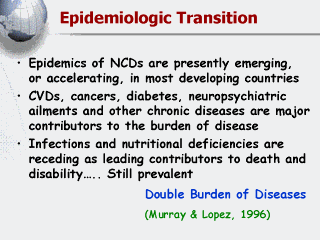 |
The second
half of the 20th century witnessed major health transitions in the world,
propelled by socio-economic and technological changes that profoundly
altered life expectancy and ways of living, while creating an unprecedented
human capacity to use science to prolong and enhance life. The most globally
pervasive change among these health transitions has been the rising burden
of non-communicable diseases (NCDs). Epidemics of NCDs are presently
emerging, or accelerating, in most developing countries1.
Cardiovascular diseases (CVDs), cancers, diabetes, neuropsychiatric ailments
and other chronic diseases are becoming major contributors to the burden of
disease, even as infections and nutritional deficiencies are receding as
leading contributors to death and disability
|
